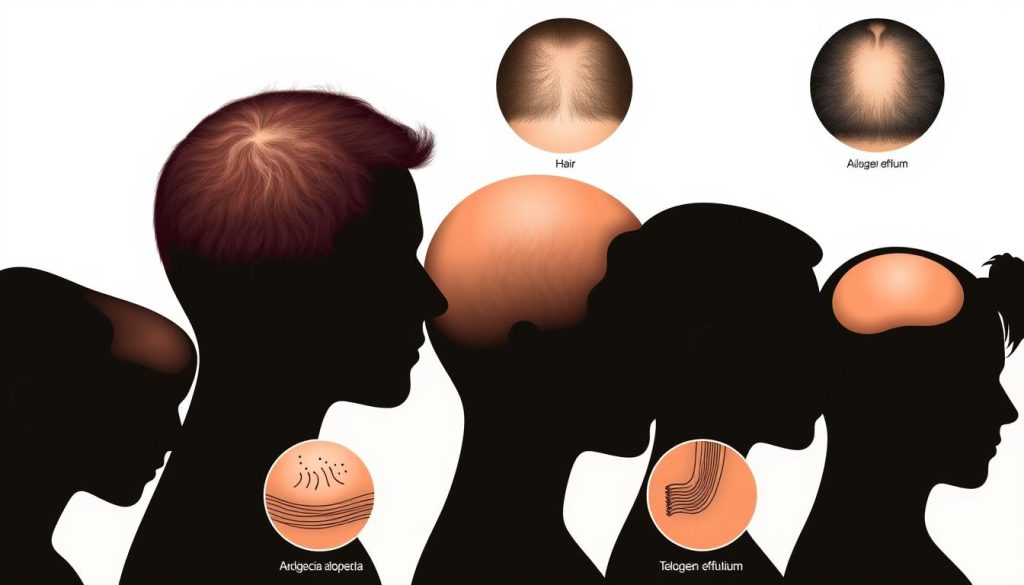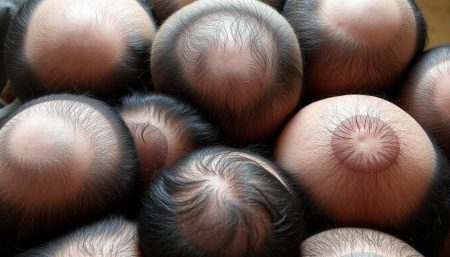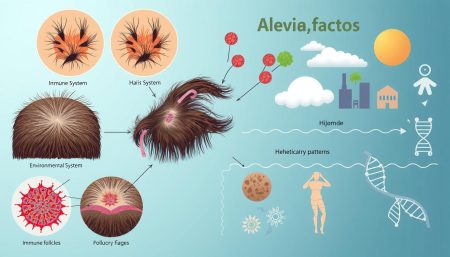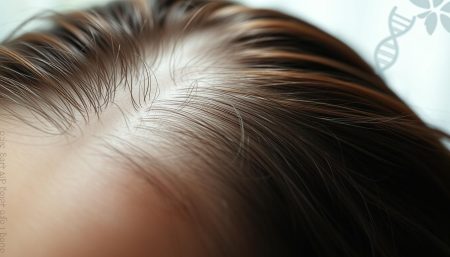Every strand of hair tells a story of our lives, beyond just looks. When people ask “what is alopecia,” they seek more than just medical answers. They look for empathy and understanding.
Alopecia, or hair loss, can be a small change or complete baldness. It affects millions worldwide, leading them on a journey of treatment and seeking answers.
Alopecia is not just about hair; it touches our self-image deeply. Each hair loss experience carries its own emotional weight. The journey ahead is about understanding and finding comfort in this challenging time.
We explore alopecia’s complexities, from its mysterious causes to its real-life effects. Our goal is to guide through the details of hair loss. We aim to offer support and education to those affected and their families.
Key Takeaways
- Understanding alopecia is key to compassionately addressing hair loss.
- The types of alopecia range widely, influencing treatment options.
- The causes of hair loss are multifaceted, requiring a holistic approach.
- The emotional ramifications of alopecia are just as significant as the physical ones.
- Educating oneself on alopecia treatment can empower those affected.
Exploring the Basics of Alopecia and Hair Loss
Understanding alopecia is key. It’s a condition that affects many people worldwide. It comes in different forms, each with its own challenges and emotional effects. This section will give you a detailed look, covering how common it is, its psychological impact, and debunking common myths.
Defining Alopecia and Its Prevalence
Alopecia is a condition that causes hair loss. It can lead to bald patches and thinning hair. It doesn’t pick favorites, affecting both men and women, and all ethnic groups. While it may seem like just a cosmetic issue, it can be linked to serious health problems.
The Emotional Impact of Losing Hair
Going through hair loss is a deeply personal and often tough experience. It can make people feel very low about themselves. It can even lead to serious mental health issues like anxiety and depression. It’s important to understand this to support those going through it.
Common Misconceptions and Facts
It’s important to clear up misconceptions about alopecia. It’s not just stress or something that happens to older people. Often, it’s genetics or an autoimmune issue that causes hair loss. By spreading the truth, we can help reduce stigma and encourage people to get help.
| Myth | Fact |
|---|---|
| Only older adults experience hair loss | Alopecia can affect people of all ages, even children and teens |
| Wearing hats causes bald patches | Hair loss due to hats is a myth; it’s predominantly genetic and medical related |
| Stress is the main cause of alopecia | While stress can exacerbate the condition, genetics and autoimmune factors play a larger role |
Differentiating Between Hair Loss Types
It’s important to know the different types of hair loss. This helps find the right treatments and manage what to expect. We’ll look at alopecia areata, androgenetic alopecia, and scarring alopecia. Each has its own causes and effects, often tied to autoimmune disorders, genetics, or other reasons.
Alopecia Areata: Spot Baldness
Alopecia areata is caused by an autoimmune disorder. It makes the immune system attack hair follicles. This leads to sudden and unpredictable baldness. Bald patches can pop up anywhere, including the scalp, face, and other areas.
Androgenetic Alopecia: Pattern Baldness
Androgenetic alopecia, or pattern baldness, is common in both men and women. It’s caused by hormones and genetics. Men often see a receding hairline and bald spots. Women notice thinning hair, especially on the crown.
Scarring Alopecia: Permanent Hair Loss
Scarring alopecia causes permanent hair loss. It happens when inflammation destroys hair follicles, replacing them with scar tissue. This can be due to infections, diseases, or physical trauma to the scalp.
Understanding these conditions helps with diagnosis and treatment. For example, treatments for autoimmune-related hair loss are different from those for hormonal or genetic types.
| Type of Alopecia | Primary Cause | Characteristics | Treatment Focus |
|---|---|---|---|
| Alopecia Areata | Autoimmune Disorder | Sudden bald patches | Immunomodulatory therapies |
| Androgenetic Alopecia | Genetics and Hormones | Pattern baldness | Hormonal therapy, hair transplantation |
| Scarring Alopecia | Inflammation (various causes) | Permanent hair loss with scar formation | Anti-inflammatory medications |
What Is Alopecia: Understanding the Condition
Alopecia is more than just hair loss. It’s a sign of deeper health issues. Finding the right alopecia treatment is a journey of discovery for many.

Understanding alopecia means knowing the difference between temporary and chronic hair loss. For those experiencing hair shedding, it can be overwhelming. They need reliable information and support.
Alopecia can take many forms. It can cause small bald patches or more widespread hair loss. Knowing this helps in understanding the condition better.
- Recognition of early signs and symptoms
- Assessment of hair loss patterns across different areas of the scalp
- Understanding the impact of alopecia on overall health and well-being
Talking about alopecia treatment helps clear up myths. It sets realistic expectations for treatment results. New research brings hope for better treatments for hair shedding.
Exploring alopecia’s details empowers people. It gives them the knowledge and support to face this condition with strength and hope.
Investigating the Causes of Alopecia
Exploring the reasons behind hair loss helps us understand alopecia. This condition can greatly affect a person’s life quality.
Genetic Factors and Family History
Our genes from our parents can reveal a lot about health issues, including hair loss. Research links family history to alopecia areata. This means people with family members who lost hair are more likely to experience it too.
Autoimmune Responses and Alopecia
Alopecia areata happens when the immune system attacks hair follicles. This leads to hair loss in patches. It’s unpredictable and can cause a lot of emotional pain.
Environmental Triggers
Stress, toxins, and diet can also lead to or worsen alopecia. While not all environmental factors cause alopecia, they can speed up its start in people who are genetically prone.
Autoimmune Disorder and Its Role in Alopecia Areata
Autoimmune disorders play a big role in hair loss, especially in alopecia areata. They cause sudden bald patches. This helps us understand how treatments for alopecia are developed.
The Biology of an Autoimmune Attack on Hair Follicles
In alopecia areata, the immune system attacks healthy hair follicles. These follicles are usually resting but suddenly become active. This makes them targets for the immune system’s attack.
This wrong immune response causes the bald patches seen in the disorder.
Diagnosing Autoimmune-Related Hair Loss
Doctors need to carefully check for autoimmune disorders in hair loss. They look for more than just bald patches. They use clinical exams and specific tests to confirm the diagnosis.
These tests include blood tests to check for other autoimmune disorders. Sometimes, they also do scalp biopsies to examine the follicles closely.
It’s important to find good treatments for alopecia. The goal is to stop the immune system’s wrong attack and help hair grow back on bald patches.
| Diagnostic Method | Purpose | Utility in Alopecia Areata |
|---|---|---|
| Blood Tests | Identify autoimmune markers | Highly useful in initial screening |
| Scalp Biopsy | Examine follicle health | Essential for confirming autoimmune attack |
| Clinical Examination | Assess extent of hair loss | Crucial for treatment planning |
Identifying Symptoms: From Thinning Hair to Bald Patches
Spotting alopecia’s early signs can make treatments more effective. This part talks about the first signs, like thinning hair and shedding. It also covers how these signs turn into bald patches. Knowing these signs is key for getting medical help on time.
Early Signs of Thinning and Shedding
Thinning hair and shedding are the first signs of alopecia. People might see more hair falling out when they brush or wash their hair. At first, it seems like just part of hair growth. But if more than a hundred hairs fall out daily, it could mean alopecia is starting.
Recognizing the Development of Bald Patches
Bald patches are a clear sign of hair loss. They start small and grow bigger, becoming more obvious. The scalp at these spots is usually smooth and can vary in size. It’s important to watch for these changes and see a dermatologist right away.
Other Dermatological Signs Accompanying Hair Loss
Along with thinning hair and bald patches, other skin issues can show up. You might see scalp redness, dandruff, or scaly patches around hair follicles. These signs help doctors figure out what kind of alopecia you have and suggest the right treatment.
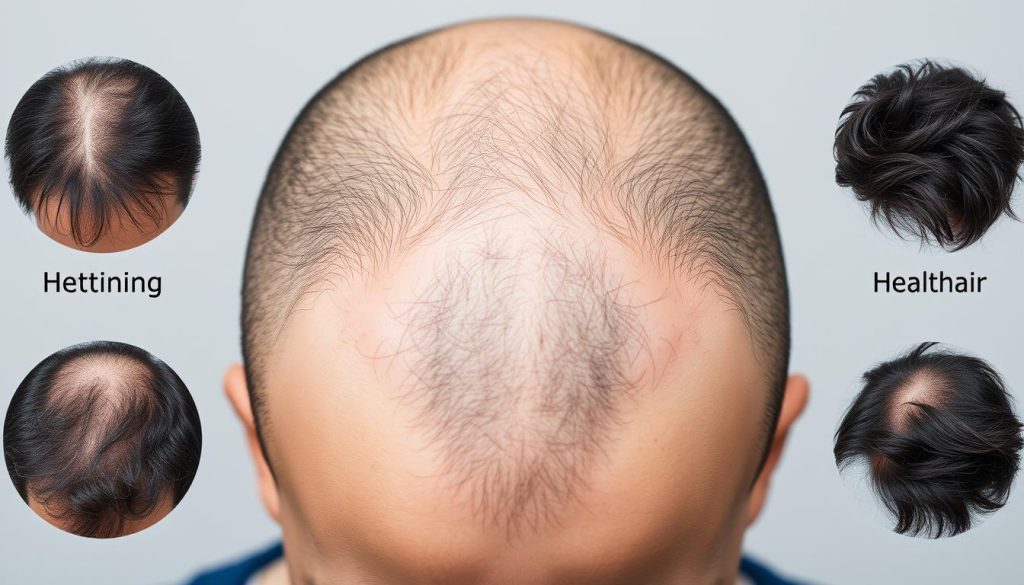
Hormones and Stress: Contributing Factors to Hair Shedding
Hormones and stress play big roles in hair loss and thinning hair. They can cause big changes in hair health, leading to stress-related alopecia. This part looks closely at how hormonal changes and stress can make hair fall out.
Hormonal imbalances, like thyroid issues or changes during pregnancy and menopause, can harm hair follicles. Stress can also mess with hair growth by making follicles shed too soon. To fight these problems, finding and fixing hormonal imbalances and managing stress are key steps to less hair loss.
- Understanding how cortisol (the stress hormone) affects hair growth cycles.
- Exploring therapeutic approaches that address hormonal imbalances.
- Implementing stress management techniques such as mindfulness, exercise, and adequate sleep to mitigate hair loss.
Seeing a healthcare professional to check hormonal levels and find treatments can help manage hair loss. Also, taking a holistic approach that includes stress reduction can help keep hair healthy.
Recognizing and addressing the symptoms of hormonal imbalances and psychological stress can significantly reduce hair loss and improve overall well-being.
Nutritional Deficiencies and Alopecia Causes
Understanding how nutritional deficiencies lead to hair loss causes is key. Eating the right foods can help prevent and treat alopecia.
Vital Nutrients for Healthy Hair Growth
Some vitamins and minerals are crucial for hair health. They include:
- Vitamin A – Supports the healthy growth of cells, including those in hair follicles.
- B-complex vitamins (especially Biotin) – Known for enhancing hair strength and texture.
- Vitamin C – An antioxidant that helps protect hair structures from oxidative stress.
- Vitamin D – Involved in the creation of new hair follicles and may help in alopecia treatment.
- Vitamin E – Helps in maintaining hair growth and its natural shine.
- Iron – Essential for blood production, iron helps carry oxygen to hair follicles.
- Zinc – Plays a critical role in hair tissue growth and repair.
- Selenium – Helps prevent hair loss causes by protecting the scalp from oxidative damage.
Supplements can help with nutritional deficiencies. But, always talk to a doctor before taking them.
Impact of Diet on Hair Health
Eating well can greatly improve hair quality and growth. A diet lacking in nutrients can lead to hair loss.
Changing your diet can be a simple way to treat alopecia. What we eat affects our hair health a lot.
Eating foods rich in nutrients can fight nutritional deficiencies. Knowing how important nutrition is for hair is vital.
To learn more about how diet affects hair health, read about nutritional deficiencies and alopecia.
Medical Conditions and Medications Affecting Hair Health
Hair loss is linked to many medical conditions and medications. Some health issues and treatments can cause hair loss. This shows how complex managing hair health can be.
Thyroid Disorders and Hair Loss
Thyroid problems can sneak up on hair health, leading to hair loss. Both hypothyroidism and hyperthyroidism can make hair fall out too soon. This can cause thinning and even baldness if not treated.
People with thyroid issues should watch their hair closely. It’s a sign of their overall health.
Side Effects of Drugs Leading to Alopecia
Some medicines can cause hair loss as a side effect. This includes drugs for cancer, blood thinners, and heart conditions. It’s important to understand these side effects.
For many, hair loss happens during tough times. We aim to help with both medical and emotional support.
FAQ
Q: What is alopecia and what causes it?
A: Alopecia is a term for hair loss, from thinning to baldness. It can be caused by genetics, autoimmune issues, environmental factors, hormonal imbalances, stress, and nutritional deficiencies. It can also be triggered by certain medical conditions and some medications.
Q: How common is alopecia and who does it affect?
A: Alopecia affects people of all ages, genders, and ethnicities. It’s a widespread condition that impacts millions worldwide. Alopecia areata, for example, might affect up to 2% of people at some point.
Q: What are the emotional impacts of experiencing hair loss?
A: Hair loss can hurt a person’s self-esteem and emotional health. It can cause feelings of embarrassment, anxiety, and depression. Hair loss affects personal identity and beauty standards deeply.
Q: What are some common misconceptions about hair loss?
A: Many think alopecia is only caused by stress or genetics. But, many other factors play a role. It’s also a myth that hair loss only affects men. Women and children can also experience it.
Q: Can alopecia be treated?
A: There’s no cure for some alopecia types, but treatments can help. These include medical therapies, medications, lifestyle changes, and alternative treatments. The success of these treatments varies by person.
Q: How does an autoimmune disorder contribute to alopecia areata?
A: In alopecia areata, the immune system attacks healthy hair follicles. This leads to hair loss. The exact reason is not known, but it involves an autoimmune response that disrupts hair growth.
Q: What early signs can indicate the onset of hair thinning or bald patches?
A: Early signs include more hair shedding, thinning, or small bald spots. You might also notice hair texture or color changes before it falls out. Sometimes, the scalp may tingle or itch.
Q: How do hormonal imbalances and stress relate to hair loss?
A: Hormonal issues, like thyroid problems or menopause, can disrupt hair growth. Stress, emotional or physical, can also cause hair shedding. This shedding can be temporary but sometimes becomes chronic.
Q: What role does nutrition play in hair health?
A: Nutrition is key for hair health. A diet lacking in proteins, vitamins, and minerals can lead to hair loss. Nutrients like iron, zinc, and vitamins A, B, C, and E are especially important.
Q: Can thyroid disorders and medications lead to hair loss?
A: Yes, thyroid issues can cause hair thinning or loss. Some medications, like chemotherapy drugs and blood thinners, can also lead to hair loss. This can be temporary or permanent.












